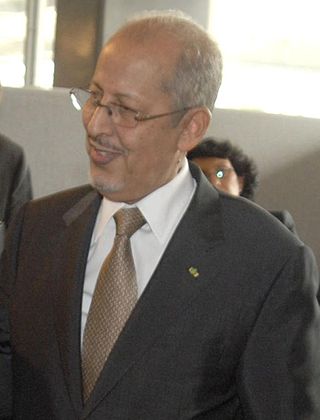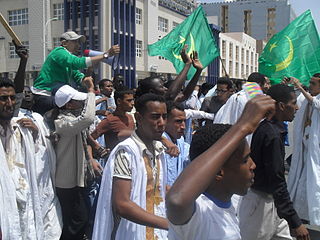Contents
| |||||
| Decades: | |||||
|---|---|---|---|---|---|
| See also: | |||||
Events in the year 2024 in Mauritania .
| |||||
| Decades: | |||||
|---|---|---|---|---|---|
| See also: | |||||
Events in the year 2024 in Mauritania .
The original inhabitants of Mauritania were the Bafour, presumably a Mande ethnic group, connected to the contemporary Arabized minor social group of Imraguen ("fishermen") on the Atlantic coast.

Mauritania is a presidential democracy, but has suffered from repeated military coups since its Independence in November 1960. For 18 years after independence, Mauritania was a one-party state under Moktar Ould Daddah. This was followed by decades of military rule. The first fully democratic presidential election in Mauritania occurred on 11 March 2007, which marked a transfer from military to civilian rule following the military coup in 2005. The election was won by Sidi Ould Cheikh Abdallahi, who was ousted by another military coup in 2008 and replaced by general Mohamed Ould Abdel Aziz. Mauretania underwent its first peaceful transition of power after the 2019 presidential election, although this was between two presidents of the ruling UPR party and former army generals.

Sidi Mohamed Ould Cheikh Abdallahi was a Mauritanian politician who was President of Mauritania from 2007 to 2008. He served in the government during the 1970s, and after a long period of absence from politics he won the March 2007 presidential election, taking office on 19 April 2007. He was deposed in a military coup d'état on 6 August 2008.
In December 1984, Haidallah was deposed by Colonel Maaouya Ould Sid'Ahmed Taya, who, while retaining tight military control, relaxed the political climate. Ould Taya moderated Mauritania's previous pro-Algerian stance, and re-established ties with Morocco during the late 1980s. He deepened these ties during the late 1990s and early 2000s as part of Mauritania's drive to attract support from Western states and Western-aligned Arab states. Mauritania has not rescinded its recognition of Polisario's Western Saharan exile government and remains on good terms with Algeria. Its position on the Western Sahara conflict has been, since the 1980s, one of strict neutrality.

Mohamed Ould Abdel Aziz is a retired Mauritanian military officer and politician who served as the 8th President of Mauritania from 2009 to 2019.

Mauritania, formally the Islamic Republic of Mauritania, is a sovereign country in Northwest Africa. It is bordered by the Atlantic Ocean to the west, Western Sahara to the north and northwest, Algeria to the northeast, Mali to the east and southeast, and Senegal to the southwest. By land area Mauritania is the 11th-largest country in Africa and 28th-largest in the world; 90% of its territory is in the Sahara. Most of its population of some 4.3 million lives in the temperate south of the country, with roughly a third concentrated in the capital and largest city, Nouakchott, on the Atlantic coast.
Gogui or Gogui Zammal, Kouki Zemal, etc. is a village and rural commune in the Hodh El Gharbi Region of Mauritania. It contains the main border crossing between Mauritania and Mali, and is the point from which Mauritania sends illegal migrants back to Mali. The crossing is normally busy 24 hours a day, since it is the main point of entry for foreign goods into Mali, but has been closed during periods of tension between the two countries.

Mauritania–Russia relations are the bilateral foreign relations between the Russian Federation and Mauritania.

The 2011–2012 Mauritanian protests were a series of protests in Mauritania that started in January 2011, influenced by and concurrent with the Arab Spring, and continued into 2012. The mostly peaceful protest movement demanded that President Mohamed Ould Abdel Aziz institute political, economic, and legal reforms. Common themes of protest centered around civil-military relations, slavery, other human rights abuses the opposition accused the government of perpetrating, and economic issues.

Presidential elections were held in Mauritania on 22 June 2019, with a second round planned for 6 July if no candidate had received more than 50% of the vote. The result was a first round victory for Mohamed Ould Ghazouani who won with 52 percent of the vote. However, opposition rejected the results, calling it "another army coup." On 1 July 2019, Mauritania's constitutional council confirmed Ghazouani as president and rejected a challenge by the opposition.

Mohamed Ould Cheikh Mohamed Ahmed Ould Ghazouani, also known as Ghazouani and Ould Ghazouani, is a Mauritanian politician and retired army general who has served as the 9th President of Mauritania since 2019, and the chairperson of the African Union since February 2024.

Mohamed Ould Bilal, is a Mauritanian politician who served as the prime minister of Mauritania from 6 August 2020 to 2 August 2024.

Parliamentary elections were held in Mauritania on 13 and 27 May 2023, alongside regional and local elections.

Presidential elections were held in Mauritania on 29 June 2024. Incumbent Mohamed Ould Ghazouani won re-election for his second and final term as president, increasing his vote share by four points.
Events in the year 2024 in Djibouti.
The 2024 Nouakchott migrant boat disaster occurred on 22 July 2024, when a pirogue carrying hundreds of migrants capsized near the coast of Nouakchott, the capital and largest city of Mauritania. At least 15 migrants were killed in the disaster, with over 195 more categorized as missing.
Mohamed Melainine Ould Eyih is a Mauritanian educationalist and politician. From 2019 to 2022 he was Minister of National Education and Education System Reform.

Mokhtar Ould Djay is a Mauritanian politician serving as the prime minister of Mauritania since 2 August 2024. He previously served as Minister of Finance and Minister of Economy and Finance under the presidency of Mohamed Ould Abdel Aziz, and more recently as Head of the Office of President Mohamed Ould Ghazouani.